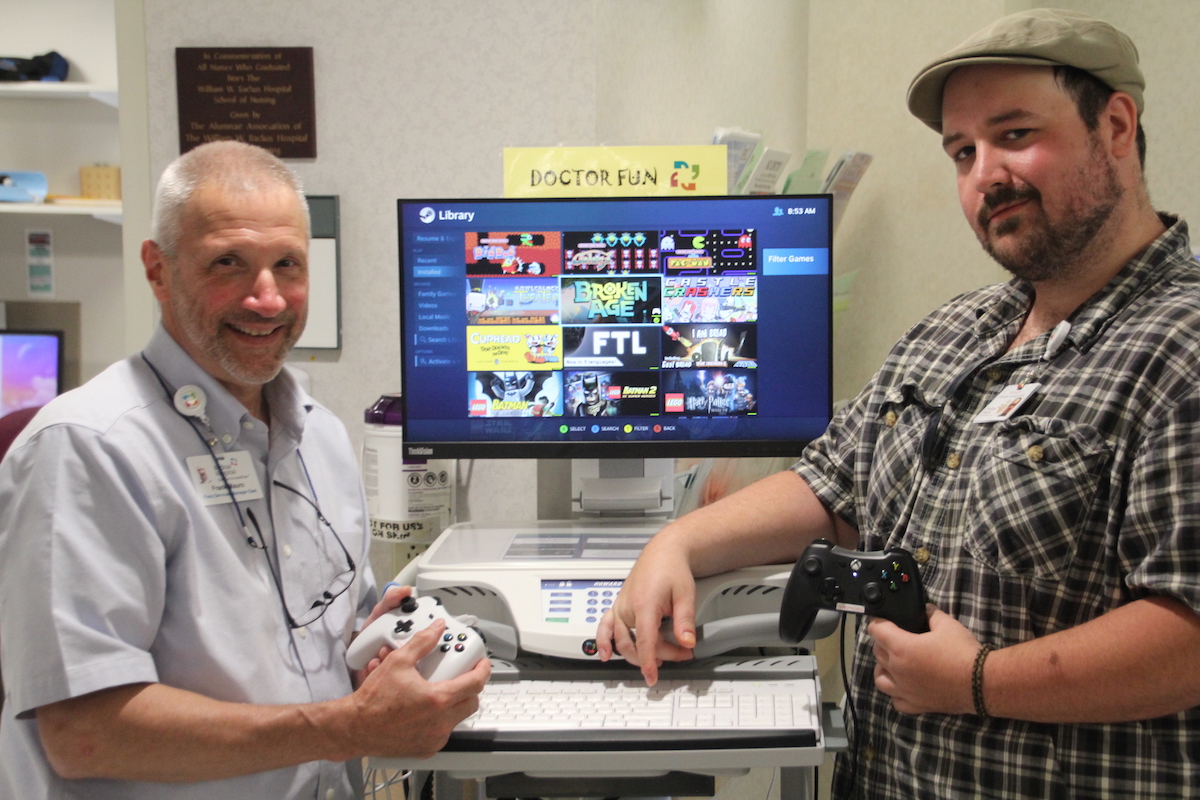<< Back
Meet Dr. Fun: Can Video Games Help Healing?

July 25, 2019
Dr. Fun is now on call at Backus Hospital in Norwich.
Dr. Fun, a mobile video-game platform for patients now being piloted on Backus’ E4 surgical unit is the brainchild of Ryan Kelly from ITS Field Services in the East Region. Kelly, with the help of colleague Frank Mauro, used an old WOW (Workstation on Wheels) cart that was destined for the trash bin and attached a more powerful gaming computer to create a mobile suite of video games for patients to use during some of those long hours waiting for tests, procedures or being transitioned out of the hospital.
“I’ve been there, stuck in a hospital bed staring at the wall going stir crazy. It’s boring. There’s nothing on television, and you get bored of every app on your phone fairly quickly,” said Kelly. “We want to give our patients something different, something engaging that just makes the time fly by while they heal. That’s the beauty of video games.”
Patients can sit bedside or upright in a chair to use a mouse and keyboard, or lie back in bed and use a controller. They can even play along with up to four family members on multiplayer supported games. Dr. Fun offers everything from classic arcade games to deep Role Playing Game (RPG experiences), and everything in between, said Kelly.
Patients are given an evaluation form to offer their feedback on the initiative and Kelly says response has been great so far.
Dr. Paul Weigle, Associate Medical Director at Natchaug Hospital, Chair of the American Academy of Child and Adolescent Psychiatry’s Media Committee and a member of the Scientific Advisory Board of Children and Screens: The Institute for Digital Media and Child Development, applauds the effort by the ITS team saying that studies have shown the therapeutic effects of video games on medical surgical patients, including less reported pain, less stress and quicker transitions from the hospital.
“It’s a fantastic resource for patients. Video games are really unique in their ability to engage players in such a challenging way that it requires their full attention in order to play. That’s a powerful distraction technique from the anxiety, pain, and stress associated with medical and surgical procedures,” says Dr. Weigle. “In some cases, video games have been shown to work as well as hypnosis and better than anxiety medication given in these situations.
As someone who has been patient before, Kelly says he wants patients to have access to something he knows will work.
“We’re not reinventing the wheel, video games have been used in pediatric hospitals for a while now, with incredible results,” he said. “Eventually those kids grow up, but they don’t stop being gamers. Why let the kids have all the fun, let’s bring this idea to a new market and make it better for everyone.”
For more information about Backus Hospital in Norwich, click here.